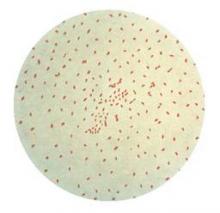Protection against pertussis "wanes substantially" 5 years after completion of the series of acellular pertussis vaccines, according to a report published online Sept. 12 in the New England Journal of Medicine.
In a study prompted by the 2010 pertussis outbreak in California, researchers found that the risk of pertussis rose by 42% each year after the fifth dose of DTaP was received.
They could not determine the vaccine’s initial effectiveness, however, because California’s near-100% vaccine coverage meant there was no control group of unvaccinated children. Nonetheless, the investigators extrapolated that if the initial effectiveness was 95% – making the risk of pertussis in vaccinated children only 5% – that risk would increase to 29% after 5 years.
"The corresponding decrease in DTaP effectiveness would be from 95% to 71%," said Dr. Nicola P. Klein, director of the Kaiser Permanente Vaccine Study Center, Oakland, Calif., and her associates.
"Our findings highlight the need to develop new pertussis-containing vaccines that will provide long-lasting immunity," they noted (N. Engl. J. Med. 2012;367:1012-9 [doi:10.1056/NEJMoa1200850]).
During the 2010 outbreak, the incidence of pertussis was the highest California has seen since 1958.
Dr. Klein and her colleagues performed a case-control study using information in the Kaiser Permanente database on 277 patients aged 4-12 years who had received the full series of the DTaP vaccine but had nevertheless tested positive for pertussis between 2006 and 2011. There were two control groups: 3,318 patients who had tested negative for pertussis during the same period, and 6,086 patients matched for age, sex, race/ethnicity, and residence.
"The large population in the health plan allowed controls to be matched to PCR-positive children on many potential confounders," the investigators said.
The overall incidence of pertussis in the study population as a whole during this period was 5.4%.
Both older age and increasing time since receiving the fifth dose of DTaP were associated with a higher rate of pertussis. The incidence was 4.5% among 6-year-olds, 12.2% among 8-year-olds, and 18.5% among 10-year-olds.
"The incidence of pertussis was highest among the population of children who were 8-11 years of age and who had received the full five-dose series of DTaP in childhood, suggesting that the waning efficacy of the fifth dose among school-age children played a key role in both allowing and sustaining the recent pertussis outbreak," the researchers said.
The researchers were surprised by the fact that pertussis incidence was higher in these preteens than in teenagers, who had likely received the whole-cell pertussis vaccine rather than the acellular DTaP. Teenagers traditionally have higher rates of pertussis and are considered a major reservoir of the infection.
"The odds ratio for pertussis was 1.42 per year, indicating that each year after the fifth dose of DTaP was associated with a 42% increased odds of acquiring pertussis," Dr. Klein and her associates said.
The findings are consistent with the results of clinical trials that assessed the duration of the vaccine’s protection, as well as other observational studies. "Taken together, these studies indicate that protection is less enduring with DTaP than with whole-cell pertussis vaccines," they said.
The Centers for Disease Control and Prevention recommends routine administration of the Tdap vaccine, a vaccine with reduced pertussis-antigen content, beginning at 11 years of age. But the limited duration of protection from the acellular vaccine found in these studies "raises the question of whether routine administration of Tdap in younger children is warranted," the investigators added.
"Prevention of future outbreaks will be best achieved by developing new pertussis-containing vaccines that provide long-lasting immunity," they noted.
This study was supported by Kaiser Permanente. Dr. Klein and an associate reported grants to their institution by GlaxoSmithKline, Merck, Novartis, Pfizer, and Sanofi Pasteur.



